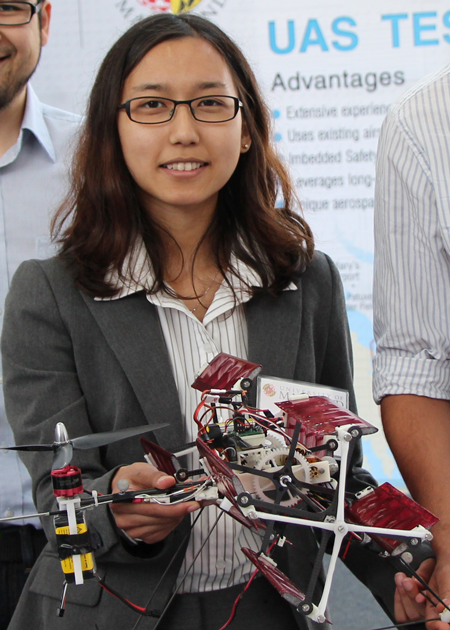Shrestha Receives 2015 NSF Graduate Research Fellowship
Shrestha joined the Aerospace Engineering at the University of Maryland as an undergrad in the fall of 2008. Since then, she has worked at the Alfred Gessow Rotorcraft Center (AGRC), where her research experience as an undergraduate led to a journal publication, three professional conference publications and First Place at the 2012 AIAA region I-MA student conference in the undergraduate category. In 2011, the rotorcraft community recognized her work with an American Helicopter Society International Vertical Flight Foundation Undergraduate Scholarship. She has interned with Sikorsky Aircraft Corporation, and in fall 2012, she began her graduate studies at UMD under the guidance of Distinguished Professor Inderjit Chopra professor and director of AGRC, and Moble Benedict. Shrestha has been working on developing the cyclocopter, a revolutionary cycloidal rotor micro-air vehicle (MAV). Using a circular array of blades that rotate around a vertical axis, the Cyclocopter has performance and efficiency advantages over conventional rotorcraft at MAV scales. The rotor configuration allows the resulting thrust to be instantaneously vectored, affording improved maneuverability over conventional rotors. Although the concept existed since the early 20th century, the cyclocopter MAV was the first cycloidal rotor vehicle to achieve stable hover and forward flight as a result of her research efforts. In spring 2015, she began her Ph.D. in aerospace engineering at Maryland, and will continue her cyclocopter research. "Winning the prestigious NSF fellowship is definitely a great stepping stone for my career," said Shrestha. "The generous funding will provide me greater flexibility to determine the direction of my research for the next few years." The NSF Graduate Research Fellowship Program (GRFP) helps ensure the vitality and diversity of the scientific and engineering workforce of the United States. The program recognizes and supports outstanding graduate students who are pursuing research-based master's and doctoral degrees in science and engineering. The GRFP provides three years of support for the graduate education of individuals who have demonstrated their potential for significant achievements in science and engineering. Learn more about the NSF Graduate Research Fellowship Program.
Related Articles: April 9, 2015 Prev Next |


 The National Science Foundation (NSF) awarded aerospace engineering graduate student Elena Shrestha a 2015 NSF Graduate Research Fellowship Award.
The National Science Foundation (NSF) awarded aerospace engineering graduate student Elena Shrestha a 2015 NSF Graduate Research Fellowship Award.